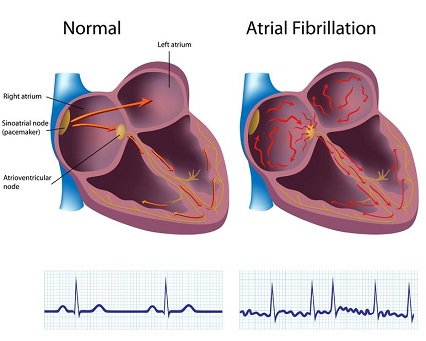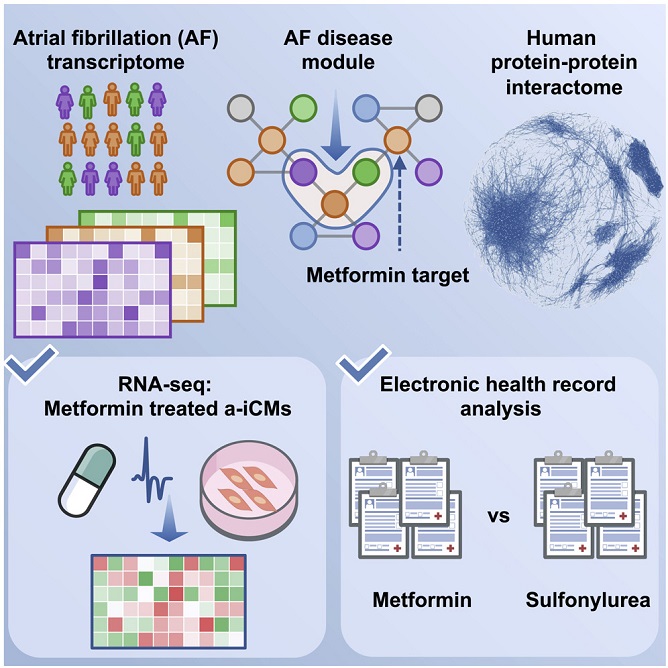Cleveland Clinic And Northwestern University Study Shows That Metformin Could Be Repurposed To Treat Atrial Fibrillation. (Findings Relevant In COVID Setting)
Source: Pharma News - Metformin - Atrial Fibrillation Oct 12, 2022 2 years, 6 months, 1 week, 5 hours, 45 minutes ago
A new study by researcher from Cleveland Clinic, Ohio-USA And Northwestern University-Illinois-USA has found that the common generic drug used to treat type 2 diabetes..metformin, can be used to treat atrial fibrillation.

Atrial fibrillation (AF) is an irregular and often very rapid heart rhythm (arrhythmia) that can lead to blood clots in the heart. AF increases the risk of stroke, heart failure and other heart-related complications.
At present, effective drugs to treat atrial fibrillation (AF) are lacking, resulting in significant morbidity and mortality.
Considering the fact that occurrences of atrial fibrillation are more prevalent due to COVID-19, the discovery comes at the right time.
https://www.ncbi.nlm.nih.gov/pmc/articles/PMC7462635/
https://newsroom.heart.org/news/study-finds-connection-between-covid-19-and-new-onset-afib
https://www.nature.com/articles/s41598-022-16113-6
https://www.ahajournals.org/doi/10.1161/CIRCEP.121.010666
https://heart.bmj.com/content/108/12/902
This new research demonstrates that network proximity analysis of differentially expressed genes from atrial tissue to drug targets can help prioritize repurposed drugs for AF.
Utilizing enrichment analysis of drug-gene signatures and functional testing in human inducible pluripotent stem cell (iPSC)-derived atrial-like cardiomyocytes, the study team identified metformin as a top repurposed drug candidate for AF.
By utilizing the active compactor, a new design analysis of large-scale longitudinal electronic health record (EHR) data, the study team determined that metformin use is significantly associated with a reduced risk of AF (odds ratio = 0.48, 95%, confidence interval [CI] 0.36–0.64, p < 0.001) compared with standard treatments for diabetes.
This is one of the few studies that utilizes network medicine methodologies to identify repurposed drugs for atrial fibrillation treatment and identifies metformin as a candidate drug. The study findings showed that metformin induces directional changes in AF disease module genes.
The study findings were published in the peer reviewed journal: Cell Reports Medicine.
https://www.cell.com/cell-reports-medicine/fulltext/S2666-3791(22)00298-1
The study was built on ongoing collaborative Cleveland Clinic research to support further investigation into metformin as a drug repurposing candidate.
The study team used advanced computation and genetic sequencing to determine that metformin's targets overlap significantly with genes dysregulated in atrial fibrillation.
Senior author, Dr Mina Chung, M.D., from Cleveland Clinic's Department of Cardiovascular Medicine in the Heart, Vas
cular and Thoracic Institute told Thailand
Medical News, “Finding drugs or procedures to treat atrial fibrillation is difficult because of potential serious side effects. There is a significant need for new treatments for atrial fibrillation as there have been no new drugs approved in more than a decade."
First author, Dr Jessica Castrillon Lal, a fifth-year graduate student in the Cleveland Clinic Molecular Medicine program added, "It's not that we've found a new drug target where it takes 20 years to test this in individuals."
 Graphical Abstract
Graphical Abstract
Co-senior author Dr Feixiong Cheng, Ph.D., an Associate Staff at the Genomic Medicine Institute in Cleveland Clinic's Lerner Research Institute further added, "We can cut off 10+ years in the drug development pipeline. We already have the information there. We just have to test it in a very computationally efficient way, such as artificial intelligence technology."
The study findings showed that metformin targeted 30 genes associated with atrial fibrillation, with direct effects on gene expression for eight. Eight other candidate drugs surfaced in the analysis, but the study team was able to identify metformin as the most promising candidate through testing and reviewing outcomes in large stores of patient data.
Dr Castrillon Lal conducts research in Dr Cheng's lab, which uses network medicine approaches to find candidate drugs for repurposing, creating vast networks of molecular interactions.
In this research, the study team narrowed down a list of 2,800 FDA-approved treatments by analyzing three data sources: a map of interactions between proteins called an "interactome"; a network of genes associated with atrial fibrillation; and each medicine's molecular or genetic targets.
AF or atrial fibrillation is the most common type of heart arrhythmia in the world and can lead to complications, including stroke and heart failure.
To date, search for therapeutics have been primarily directed toward trying to prevent arrhythmia utilizing drugs targeting the electrical system, including ion channels in the heart, or using catheter ablation to isolate the pulmonary veins where initiating beats of atrial fibrillation occur.
It has been found however, side effects, limited success and potential complications can limit these approaches.
The study was conducted in collaboration with labs led by Dr Chung, Dr Cheng, Dr David Van Wagoner, Ph.D.; Dr Jonathan Smith, Ph.D., Department of Cardiovascular and Metabolic Sciences; and Dr John Barnard, Ph.D., Department of Quantitative Health Sciences in the Lerner Research Institute.
Previous research from Dr Chung, Dr Smith, Dr Van Wagoner, and Dr Barnard had also identified the enzyme AMPK as a potential key regulator for metabolic stress.
It has been found that metabolic stress has been associated with atrial fibrillation.
These studies are related to a recently awarded US$14.2 million grant from the U.S. NIH to investigate new atrial fibrillation treatments utilizing genomic data.
The study team further supported results of the network analyses with experiments on live beating heart cells grown from human stem cells, showing favorable effects of metformin on gene expression.
For the latest on
Drug Repurposing, keep on logging to Thailand
Medical News.
Note: Do no attempt to self-treat using any drugs mentioned on this site or article without consulting a licensed medical doctor first.

